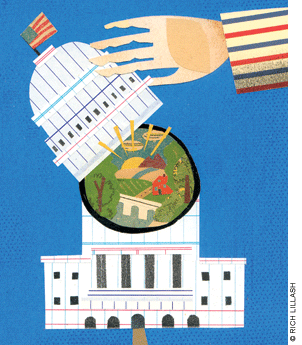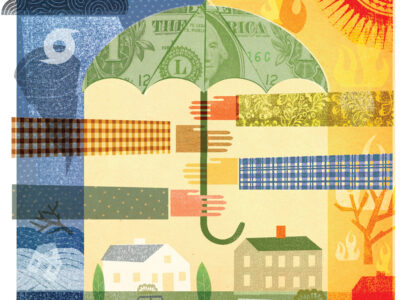
Why big government is good for us.
By Steven Conn | Not too long ago, my family and I went camping in the Four Corners region of the American Southwest. We camped at one magnificent national park after another. We drove to these places on extraordinary interstate highways that allowed us to travel over this once-difficult landscape at 65 miles per hour (okay, often faster). We passed reservoirs and irrigation projects built by the Army Corps of Engineers that provide water for agriculture and recreation for tourists.
And along the way we kept passing billboards denouncing “big government.” Some of them supported particular candidates for office; others were more homemade screeds. They all seemed very, very angry.
At first we giggled at them—yet more amusing examples of the “keep your government hands off my Medicare” hypocrisy that has infected so much of our recent political debate.
But after a few hundred miles, the joke began to wear off, and we genuinely began to wonder: Don’t these people see it? That so much of what enriches life in this part of the country has been made possible by one federal project after another?
After all, a trip like ours through the Southwest often takes you past enormous military installations, physical manifestations of an economy dependent on “big government” spending from the Pentagon. And it can take you past Indian reservations, which serve as sobering reminders that before this land was settled by the rugged individualists of American myth, it was cleared of its original inhabitants by federal troops.
From transportation and public health, to education and housing, the federal government has been instrumental in creating the kind of society Americans have wanted across the decades. Those efforts have been far from perfect, and certainly the federal government is not the answer to all our problems. But taken together, they make the case for “big government” by reminding us how seriously the federal government has taken its constitutional task: to promote the general welfare.
From the very beginnings of the nation, a substantial number of Americans have had a deep suspicion of strong centralized power, and those who rail against it usually offer three alternatives, in varying measure. First, they argue that the private sector will do a better job at creating a prosperous society than government ever will. Second, they want states, not Washington, to be the most important source of governmental authority. Third, they offer a gauzy nostalgia for the pioneer days when small communities took care of their own, and free individuals needed protection or support from no one.
The past, of course, is a little more complicated than that. So let me review a few of the historical problems with each of these alternative views of how best to build and maintain our society.
Free-market fundamentalism: The free market does a wonderful job of delivering goods and services at the best prices to consumers. It does a terrible job of things like building sewer systems, educating children, or keeping us healthy. Free-market fundamentalists insist, however, that the private sector can solve all of our infrastructure, education, and health care problems, evidence notwithstanding.
This is an ideological position rather than a set of pragmatic solutions, and our history is littered with examples of what it can and cannot accomplish. But those failures do not constitute the biggest problem with this ideology. More significantly, the premise upon which it is built is wrong: the “free market” is a fiction. There is no genuinely “free market”—a place where purely rational economic actors are free to make choices without any government interference—except in the seminar-room exercises of some economists.
Government structures the way any market will work by setting the rules of the game through the legal system and through regulatory mechanisms, among other ways. Ask anyone who has tried to do business in a country where contracts may or may not be worth the paper they are written on and where bribery substitutes for bureaucratic procedure. They can tell you about the value of these structures, and they will convince you that these government roles are essential. In addition, government creates the physical infrastructure that makes the private market work better. Again, go to a country where the roads are not maintained, where the financial system is jerry-built, and where you may or may not be able to drink the water, and you quickly learn to appreciate the blessings of basic infrastructure.
So the question is not whether the government will play a role in the market, but how, on what terms, and for whose benefit. During the Gilded Age, for example, the great industrial titans insisted that the government maintain a “laissez-faire” policy toward the economy. Then they lobbied for tariffs in order to eliminate competition from imported goods and they demanded that the National Guard be called out when their workers went on strike. Laissez-faire when it suited them, government intervention when they needed it.
The fetish of states’ rights: Those who insist that any power not specifically granted to the federal government in the Constitution must, ipso facto, belong to the states read the Tenth Amendment in the narrowest way. Historically, however, the invocation of “states’ rights” has been less about philosophical principle and more about situational ethics.
Southerners in the antebellum period insisted on their right to own slaves (and to secede from the Union to perpetuate that system of slavery) as a matter of “states’ rights.” Those same Southerners, of course, also insisted that the federal government enforce the Fugitive Slave Act, and they howled when they felt that federal law had been violated. Never mind that the act trampled on the “states’ rights” of those northern states where slavery had been abolished.
Likewise, a century later when the federal government began to dismantle the southern system of segregation through court cases and legislation, white Southerners rose up in resistance to this infringement of “states’ rights.” At the same time, white southern politicians happily accepted the federal highway money that came pouring in to build the Interstate system. No states’ rights problems there.
Beginning in the 1980s, “states’ rights” has been invoked as a way to deny women access to family planning, though why an American citizen should have less control over her reproductive health in Mississippi than in Massachusetts is more than a little difficult to defend. More recently, of course, “states’ rights” has been the tool with which to deny gay couples the right to marry and to deny them all the benefits that come with marriage.
States can certainly serve as the “laboratories of democracy,” in Louis Brandeis’s memorable phrase, when they pioneer projects that then influence the rest of the nation. More often than not, however, states’ rights constitutes less a theory of governance and more a façade to perpetuate traditions of bullying, bigotry, and oppression.
The myth of the Marlboro Man: Americans have had a century-long romance with the cowboy. He stands as the very symbol of libertarian independence, freedom, and self-reliance. President Reagan, for example—a middle-class kid from Illinois who made good in Hollywood—often had himself photographed riding horses on his ranch, looking like a cowboy. George W. Bush, scion of New England money and third-generation Yalie, also liked to portray himself as a Texas cowboy.
Everyone seems oblivious to the irony: historically, cowboys drove other people’s cattle across the plains, usually working for wages as low-level employees of large companies. They may have slept under the stars around a campfire, but their livelihoods depended on railroad companies, meat processing plants, and the market for beef back in the big cities. And those pioneering homesteaders we also like to invoke? They farmed land that the federal government gave away for free.
The nouveau libertarian notion that we are a nation of autonomous cowboys and pioneers who are owed nothing and in return owe nothing to society resembles nothing so much as the teenager who thinks he deserves to drive Mom and Dad’s car without paying for the gas or the insurance. We are all enmeshed in social obligations, networks, and relationships. To pretend otherwise is little more than an escapist fantasy. Benjamin Franklin had good advice for such people. In Franklin’s view, the notion of private property extended only to the bare necessities, “but all property superfluous to such purposes, is the property of the public, who by their laws have created it, and who may, therefore by other laws dispose of it whenever the welfare of the public shall desire such disposition. He that does not like civil society on these terms, let him retire and live among savages.”
Few of us would go as far as Franklin did, but he reminds us that certain Founders had a collective rather than strictly individual conception of the “general welfare.”
When Ronald Reagan announced in 1981 that “government is not the solution to our problems; government is the problem,” he galvanized a generation of antigovernment activism. It was a great line, but it was, characteristically, wrong. Government is neither good nor bad—it is a tool with which citizens in a democratic society carry out our collective will. As Garry Wills put it nicely, this confusion leads to a strange patriotism in which we are asked to love our country by hating our government.
Abraham Lincoln, also characteristically, had it right when he reminded the mourners at Gettysburg that ours is a “government of the people, by the people, for the people.” Which is not to say that the federal government has always been effective or efficient, or even just. Federal programs after World War II, for example, made homeownership a reality for millions, but they initially excluded African Americans from that dream.
Our federal government is nothing more and nothing less than a collective reflection of ourselves, sometimes at our best, sometimes at our worst.
Steven Conn Gr’94 is a professor of history at Ohio State University. This essay is excerpted from To Promote The General Welfare: The Case for Big Government, edited by Steven Conn, with permission from Oxford University Press USA. Copyright © 2012 Oxford University Press USA.




